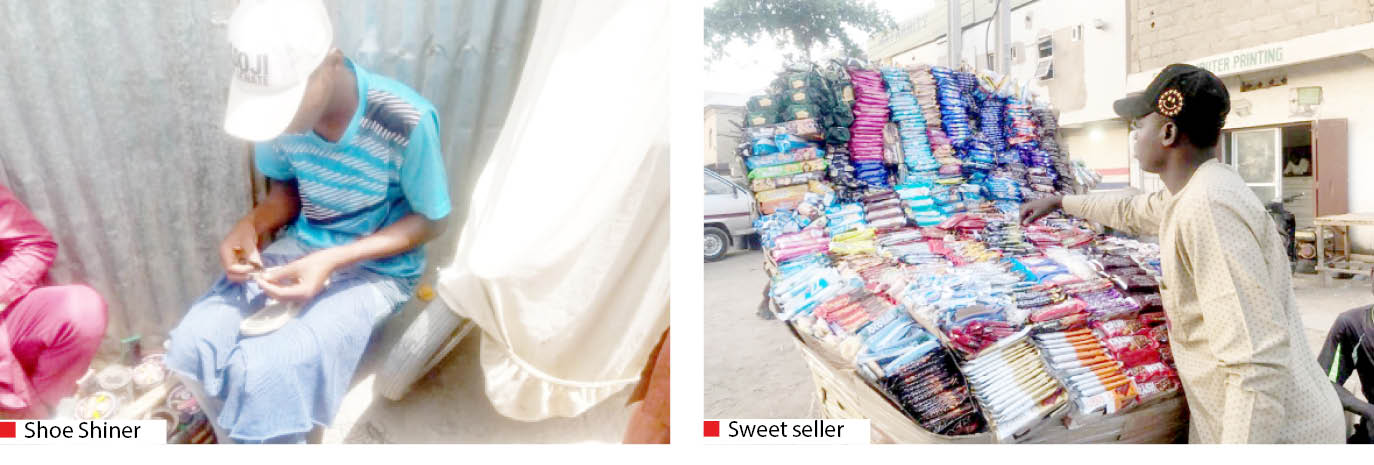Issues as Kano gov’t cancels tax for low-income biz owners
Divergent views among stakeholders in the tax generation sector in Kano State have continued to trail government’s decision to cancel tax collection from low-income business owners in the state, Daily Trust Saturday reports. The populist decision, which the government opine will bring succour to the majority of the residents, is coming at a time when […]

Gurasa seller
Divergent views among stakeholders in the tax generation sector in Kano State have continued to trail government’s decision to cancel tax collection from low-income business owners in the state, Daily Trust Saturday reports.
The populist decision, which the government opine will bring succour to the majority of the residents, is coming at a time when the state is rated among the lowest and the most difficult in revenue generation despite being the centre of commerce and the most populated in the country.
Daily Trust Saturday reports that Kano sits at number 13 with N40.33billion on the list of states’ projected annual internal revenue with fellow Northwest state Kaduna sitting on number 5 with projected annual internal revenue of N89.28bn. Other states ahead of Kano are Lagos, Rivers, Ogun, Delta, Imo, Oyo, Edo, Osun, Anambra, Akwa Ibom and Kwara.
And according to data analysis by Dataphyte, the state’s 18.29 percent (N7.38bn) projected revenue generation in Q1 of the year put it further behind at number 19.
- Burna Boy wins Best international act at 2023 BET awards
- President Tinubu, kindly rescue Nigerian Correctional Service[contact-form][contact-field label=”Name” type=”name” required=”true” /][contact-field label=”Email” type=”email” required=”true” /][contact-field label=”Website” type=”url” /][contact-field label=”Message” type=”textarea” /][/contact-form]
In similar data for 2021 provided by the National Bureau of Statistics (NBS), Kano State’s total Internally Generated Revenue for the first half of the year was N15.05bn in the same period Lagos, Rivers and Kaduna states had generated N267.2bn, N57.3bn and N26.4bn respectively.
Recall that the state governor, Abba Kabir Yusuf, declared during his inaugural speech on May 29 that small business owners in the state are now exempted from payment of taxes beginning from June. The governor, who pegged small business owners covered by the tax exemption to be those with income less than N30,000, said the taxation of this group was an injustice.

While the government has not issued guidelines on how to verify the actual earnings of small business owners that would fall in this category, the Kano State Chamber of Commerce Industry Mines and Agriculture (KACCIMA), the repository of information on commercial activities in the state, told Daily Trust Saturday it does not have a database for information on this area.
The governor however said his administration would “Create the enabling environment and provide all necessary incentives, including the facilitation of access to capital, for small, medium and large-scale entrepreneurs in the state to blossom and succeed.
Following this directive, many small business owners were excited and expressed optimism that the gesture will go a long way in reducing their burdens and also make a significant impact in improving their capital.
Speaking to Daily Trust Saturday, a trader, who sells sweets and chocolates on a truck said the development is a welcome one and that he will no longer be disturbed by the tax collectors who come to him from time to time.
“With this, I think many small business owners will have the chance to conduct hitch-free businesses. The tax collectors will be coming anyway. We don’t even know who to trust. That is why we are happy with this development,” he said.
Mustapha Salisu, a shoemaker, says paying daily tax to the government isn’t fair to them in the first place. He argued that he and his ilk are poor, trying to earn a living in a very hostile environment with prices of commodities soaring higher, hence collecting any tax from them is unfair “since the government didn’t give us jobs. I like the fact that it has been stopped by Governor Abba Kabir Yusuf.”
He appealed to the governor to look beyond abolishing tax to supporting small and micro businesses to continue to support themselves.
Aburrazaq Aliyu is an itinerant seller of a Kano popular snack called Gurasa. He shuttles many motor parks in the ancient commercial city. Aliyu told Daily Trust Saturday that he was the most joyous person when the state governor made the pronouncement.
Umar Baba, an elderly man who hawks bananas in Kano metropolis, said by virtue of his age, he used to pay the tax only when he made good sales. “I am not a young man and I don’t pay every day before the governor stopped it. I am aged so the collectors respect me. If I tell them I wouldn’t pay because I didn’t make good sales, they often let me be.”
Muhammad Muzammil, who hawks Mango at Filin Parking adjacent to Kwari Textile Market, said “I am really happy about this development. I used to pay from my little earnings but since the pronouncement, I have not been paying the daily tax to revenue people. It’s great that we voted for someone who understands our situation.”
Most of these low-income businessmen told Daily Trust Saturday that they pay a minimum of N100 per day to tax collectors and in some instances, they are made to pay more. But they admitted that they have not been regular with the payment.
However, economic experts and stakeholders in the business and tax sectors have opined that while the decision will be good and excite the small business owners, it will have a negative impact on the Internally Revenue Generation (IGR) of the state. Many of them described the decision as an effort to sabotage the system of revenue generation which will have a boomerang effect on the economy. They equally argued that the decision will also increase the number and amount of tax payments from large businesses which will create a huge problem for the sector.
Although there are no official statistics to tell the number of these businesses under the said category, it was gathered that a significant percentage of the state population are running small businesses and can fall under the category. Aside from indigenes of the state, thousands of people come to the city centre or markets in villages to run their small businesses.
Kano is rated as second after Lagos in terms of Small and Medium Enterprises (SMEs). While Lagos has over 3 million small businesses, Kano is said to have more than 1.5 million, according to data released by the United Nations.
Similarly, Kano State Chamber of Commerce, Industry, Mines and Agriculture (KACCIMA) said they have no record to show the actual database of the small business owners as they only deal with registered business entities. They said most of the small business owners are not registered, with only a few of them being captured by the state ministry of commerce.
Some of the industry experts also indicated that most of the enterprises that are registered as SMEs are fraudulently registered to evade taxation.
Speaking to Daily Trust, a stakeholder in the KACCIMA, said the large industries in the state are the sectors that deserve to be considered by the government rather than the small businesses. He said although they are not calling for them to exempt large industries from tax, they should reduce the taxes, as there are multiple taxations in the state.
The stakeholder, who also owns a rice firm and chooses not to be named, said he has over 400 staff in his company and that he has reduced the burden of unemployment for the state government. He said despite this, they are always burdened with multiple taxations from the government on a daily basis.
“Instead of the government exempting the small businesses from tax, they should reduce tax for us, the large industries. We have been bothered by multiple taxations and this has led to unfavourable conditions in our businesses. People will come to you from the state, local and even federal government levels in the name of the same tax collection,” he said.
A taxation expert, who operates a consultancy firm in Kano, Shehu Usman Umaru, said the decision by the state government is not economically wise because it has removed one of the impetus for growth from the business owners since all they have to do is maintain their current status so as not to fall out of the tax exemption net.
He said “This will make them reluctant and deviant to tax payment. This is not a global practice. What the government should do is let them pay taxes and find another way to support them. They should either reduce the tax or empower them with capital and loans to boost their business. But it is not economically wise to exempt someone from tax payment.”
Umaru said the small businesses are growing and that when they reach a significant level to pay taxes, they will not want to pay as the government didn’t put them on the right path to become regular taxpayers, which he said: “will affect future revenue generation of the state.”
Also speaking, an economic expert and professor from the Bayero University Kano (BUK), who asked for anonymity, said the decision, which he described as a populist one, will have both positive and negative impacts and that the negative impact would be most telling on the economic buoyancy of the state.
He added that the decision should have been made after making serious consultations with stakeholders in the economy and revenue generation sector to explain the consequences that may emerge as a result of the policy.
“The government will enjoy political benefits from this as it will excite these business operators. They will win their hearts and make them believe they are doing it for their progress. But the problem is that the decision will affect the IGR of the state. This is an area where we have lapses in the state. We find it difficult to generate revenue from even SMEs because people are not always ready to pay taxes. So, this will add to the menace as it will inculcate in them the behaviour of evading tax payment,” the professor said.
